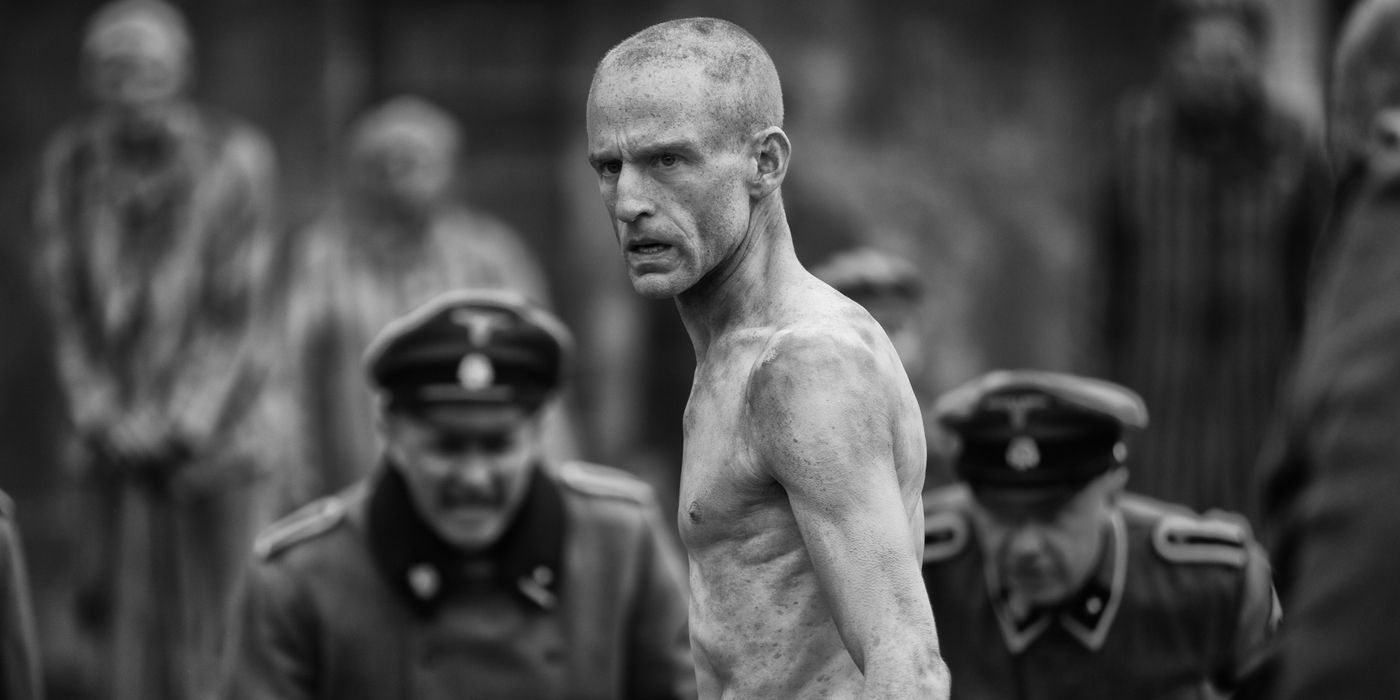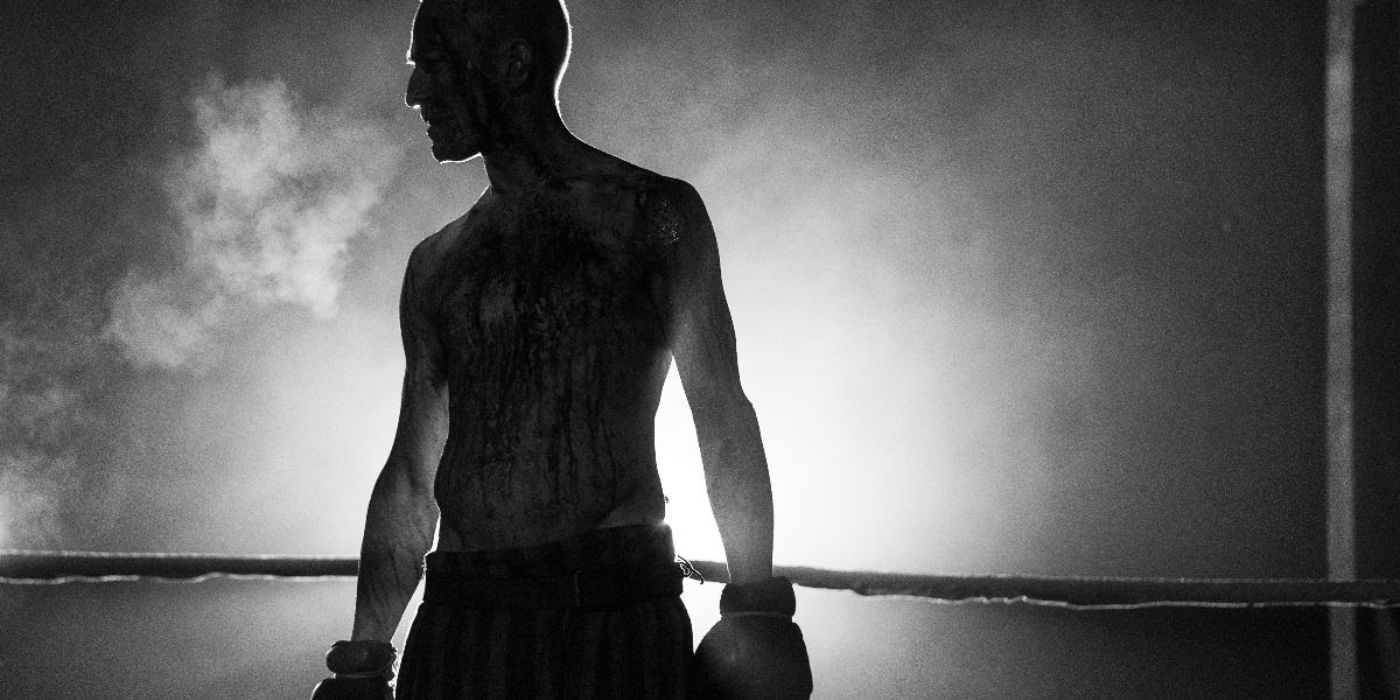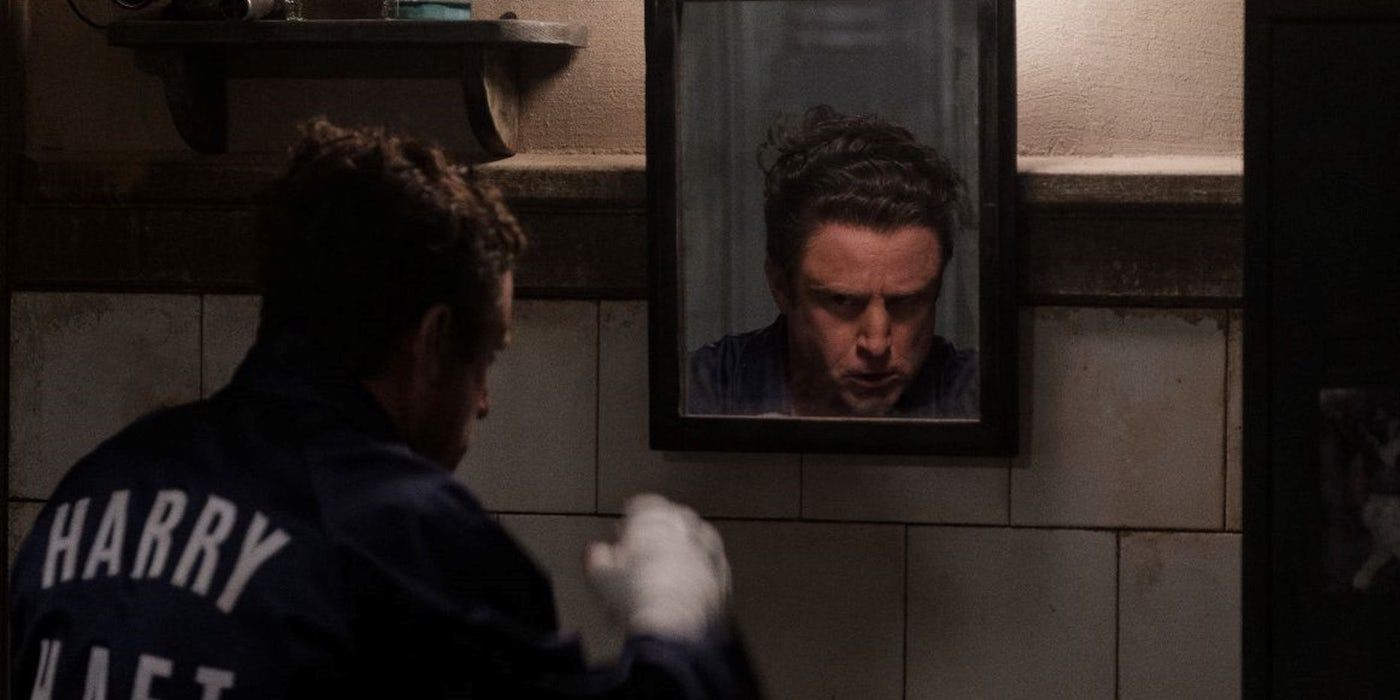Harry Haft (Ben Foster) literally fought to survive Auschwitz. While in the camps, Haft was forced by a Nazi guard (Billy Magnussen) to participate in boxing matches with other prisoners. Whoever lost the match was shot, dragged away, and the next competitor was brought in. Harry didn’t lose, living long enough to run away from the camps, and eventually emigrating to the United States, where he continued his boxing career.
Understandably, Harry doesn’t like to talk about his past and what he did to live another day, yet when a reporter, Emory Anderson (Peter Sarsgaard), wants to learn more about Harry’s story in The Survivor, he proclaims “Nothing is black and white. The sweet spot of a true story is the cracks, the common ground between Jew and Nazi.” It’s an oddly chosen line in a film that has used black and white flashbacks to portray the atrocities of Auschwitz, but also, in a film that isn’t attempting to do this in any way. It’s a strange choice for Barry Levinson’s film to point out the gray spot that makes true stories interesting, then to completely avoid that part of the story.
Instead, The Survivor, written by Justine Juel Gilmer, focuses on what it takes to make it through another day, whether through the horrors that Harry had to face, the small indignities that get him closer to his goals, or the compassion and love that he chooses to give that alters his life. Gilmer’s screenplay mostly focuses on Harry post-war life in New York, where he’s a struggling boxer trying to find his love Leah, who he lost during the war. Harry decides that if he fights Rocky Marciano, his name will get out in the world, and maybe if she’s still alive, Leah will be able to find him. In order to reach this goal, he tells part of his story to Anderson, and accepts the help of Miriam Wofsoniker (Vicky Krieps), whose job is to help reunite people separated by the war.
Through either telling parts of his story to other people, or unexpected moments that take Harry back to his haunting past, Gilmer’s screenplay also goes back to the black and white Auschwitz to show exactly what Harry had to go through to make it out of the camps. Gilmer structures The Survivor in strange ways beyond Harry’s flashbacks to Auschwitz, as the film jumps back-and-forth in Harry’s time in America in ways that don’t entirely make sense. For example, The Survivor begins with a look at a few seconds of Harry in Georgia in 1963—which means nothing to the audience on first watch—before then taking us to New York in 1949. The film frequently jumps in this way that feels both unnecessary and jarring to the forward momentum of the story.
While The Survivor seems to be building to the big fight between Harry and Rocky, the film upends that expectation, which makes the film drag significantly in the final act. Even though this is the section where we can most clearly see the monumental ways the past still alters Harry’s present, The Survivor also can’t help but feel like it’s going through the motions in telling Harry’s life that needs to be told. If Gilmer’s screenplay wants to play with the timeline, The Survivor might have benefited from spending more time showing the audience Harry’s future, while continuing to build toward Harry’s fight with Marciano.
Also holding back Harry’s incredible story from being told effectively is Levinson. The Oscar-winning director knows what it takes to make a prestige picture, with films like his Best Picture-winning Rain Man, Bugsy, and Avalon. Levinson has spent most of the last decade on biographical stories like Paterno, The Wizard of Lies, and You Don’t Know Jack. Levinson hasn’t directed an Oscar-nominated film since 1997’s Wag the Dog, yet those instincts to try and make a prestige film—complete with the monotonous and nuance-free handling of this type of film that we’ve come to expect from decades of biopics—have come back with Levinson with The Survivor. Like Sarsgaard’s reporter says, its the nuances that make a story like this great, and The Survivor just doesn’t have those instincts.
However, Harry’s story does come to life through Ben Foster’s fantastic performance. Foster has been an incredibly underrated performer over the years, with phenomenal roles in Hell or High Water, The Messenger, and 3:10 to Yuma, just to name a few, but his portrayal of Harry is full of the nuance and depth that the rest of The Survivor often lacks. Foster does justice to both the past and present of Harry, bringing to life the cruelty and barbarism of the camp, but also showing the weight of the past that still hangs over him like a cruel shadow he can’t escape. Levinson has been working with actors like Robert De Niro and Al Pacino over the last decade, and Foster’s performance here certainly cements him as a great talent equal to those legends.
Magnussen does his best to portray the gray area of this story through his performance, but again, the screenplay struggles to handle any nuance with care. Danny DeVito also gets a few lovely scenes as Rocky’s trainer that decides to help Harry before their big fight, and Krieps also has some nice moments with Harry, but unfortunately, the film’s supporting characters don’t have much life to them outside of Harry’s experiences.
The Survivor clearly has the best intentions in telling Harry Haft’s harrowing story and the decades-long journey of addressing his past and those he lost along his journey, but the filmmaking choices used to do so hold back this captivating tale. At times, through Foster’s performance, The Survivor shows glimpses of what power this film could’ve had—especially in a third-act reunion that hits all the right notes. But instead, The Survivor is too frequently going through the motions of tried-and-true biopic stories that we’ve seen countless times before, or making choices that seem daring, but ultimately hold back the power of Harry’s story.
Rating: C+
The Survivor premieres on HBO and HBO Max on April 27.



